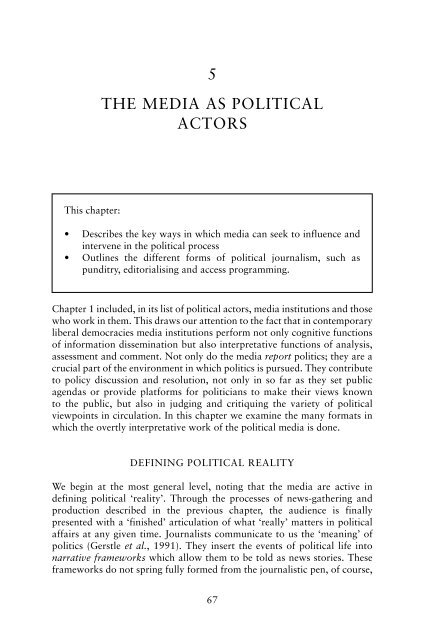20130412164339753295_book_an-introduction-to-political-communication
20130412164339753295_book_an-introduction-to-political-communication
20130412164339753295_book_an-introduction-to-political-communication
Create successful ePaper yourself
Turn your PDF publications into a flip-book with our unique Google optimized e-Paper software.
5<br />
THE MEDIA AS POLITICAL<br />
ACTORS<br />
This chapter:<br />
• Describes the key ways in which media c<strong>an</strong> seek <strong>to</strong> influence <strong>an</strong>d<br />
intervene in the <strong>political</strong> process<br />
• Outlines the different forms of <strong>political</strong> journalism, such as<br />
punditry, edi<strong>to</strong>rialising <strong>an</strong>d access programming.<br />
Chapter 1 included, in its list of <strong>political</strong> ac<strong>to</strong>rs, media institutions <strong>an</strong>d those<br />
who work in them. This draws our attention <strong>to</strong> the fact that in contemporary<br />
liberal democracies media institutions perform not only cognitive functions<br />
of information dissemination but also interpretative functions of <strong>an</strong>alysis,<br />
assessment <strong>an</strong>d comment. Not only do the media report politics; they are a<br />
crucial part of the environment in which politics is pursued. They contribute<br />
<strong>to</strong> policy discussion <strong>an</strong>d resolution, not only in so far as they set public<br />
agendas or provide platforms for politici<strong>an</strong>s <strong>to</strong> make their views known<br />
<strong>to</strong> the public, but also in judging <strong>an</strong>d critiquing the variety of <strong>political</strong><br />
viewpoints in circulation. In this chapter we examine the m<strong>an</strong>y formats in<br />
which the overtly interpretative work of the <strong>political</strong> media is done.<br />
DEFINING POLITICAL REALITY<br />
We begin at the most general level, noting that the media are active in<br />
defining <strong>political</strong> ‘reality’. Through the processes of news-gathering <strong>an</strong>d<br />
production described in the previous chapter, the audience is finally<br />
presented with a ‘finished’ articulation of what ‘really’ matters in <strong>political</strong><br />
affairs at <strong>an</strong>y given time. Journalists communicate <strong>to</strong> us the ‘me<strong>an</strong>ing’ of<br />
politics (Gerstle et al., 1991). They insert the events of <strong>political</strong> life in<strong>to</strong><br />
narrative frameworks which allow them <strong>to</strong> be <strong>to</strong>ld as news s<strong>to</strong>ries. These<br />
frameworks do not spring fully formed from the journalistic pen, of course,<br />
67
















